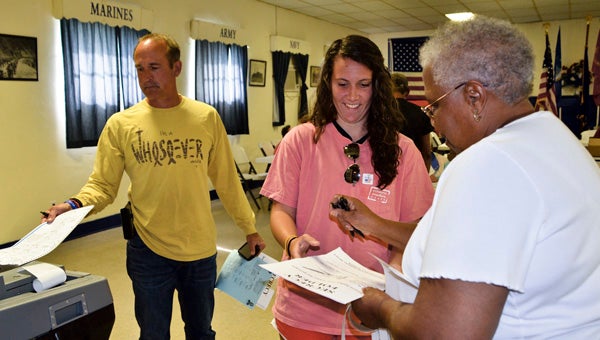Election runs smoothly even with new technology, ID law
Published 4:57 pm Wednesday, June 4, 2014

Scott Tuell (left) slips his ballot into a voting machine at American Legion Post 6 on Tuesday, as poll worker Olivia Washington (right) prepares to give Anna Adams (center) and Tuell “I Voted” stickers.
Election officials reported on Wednesday a smooth transition for Chilton County voters after several changes were implemented throughout the county for the June 3 Primary Election.
“We didn’t have any major problems this election,” Mary Miles with the Chilton County Probate Office said. “So far, we have received positive feedback from the poll workers regarding the new voting machines, and there weren’t any issues that we heard about regarding people presenting a photo ID to vote.”
One of the changes included requiring voters to present a photo ID prior to voting.
The change affected not only Chilton County voters, but voters statewide after the Voter Photo Identification Act, approved during the 2011 legislative session, went into effect in all 67 Alabama counties for the first time on June 3.
“We had a few issues where voters left an ID at home and were allowed to vote with a sworn affidavit and those came in handy,” Miles said. “We did not turn anyone away from voting, and most of the people I heard about had no issues with presenting an ID before voting.”
According to unofficial election results, 9,988 voters cast a ballot in Tuesday’s election out of 26, 253 registered voters in Chilton County.
Of those who cast a ballot, there were 9,620 (or 96.32 percent) Republican ballots and 355 (or 3.55 percent) Democratic ballots.
There were 13 individuals who voted “nonpartisan” with the 1-cent sales tax increase to fund the construction of a new hospital being the only item on the ballot.
A person without an ID was allowed to vote if two election officials identified the person as an eligible voter and signed a sworn affidavit.
Gov. Robert Bentley signed House Bill 19, and it was assigned Act. No. 2011-673.
According to the bill, an Alabama voter was required to present a specific type of photo identification at the polls in order to vote.
Another change in Chilton County this year included 21 new voting machines, as new laws required technological upgrades in counties throughout Alabama for the election.
Anything older than 15 years old required an upgrade.
“Poll workers commented that it was a lot easier than previous years,” Miles said. “All they had to do was press one button to close out the machines, and I think every precinct closed down the machines at the end of the day without any issues. It was great.”
The county is leasing the new voter machines from Election Systems and Software and the model of the machines is the DS 200 Digital Precinct Scan.
The machines will be stored at the Clanton Facility building and will be used for upcoming elections this year including the July 15 Primary Runoff Election and the Nov. 4 General Election.
Chilton County also qualified for a Help America Vote Act (HAVA) grant allowing each precinct an iPad for voting.
Poll workers were able to use the iPads to look up the voter’s list for the entire county as opposed to that particular precinct.
“In previous years, if someone showed up to a precinct and didn’t know where they were supposed to vote, the poll workers would have to call the Board of Registrar’s office and ask where that person was supposed to go. With the iPads, all the poll workers had to do was look up the name and it would tell them without requiring them to call the Board of Registrar’s.”
Miles said for larger polling places in the county, including Jemison City Hall, poll workers commented on the ease of looking up precincts for individuals to vote.
“I think with the new districts changing, some places used the iPads more than others to look up where people were supposed to vote,” Miles said. “They really worked well, and we didn’t have any complaints about them.”
Other changes for voters included “blackening” an oval on the ballot as opposed to connecting the arrows and poll workers loading the precinct results onto a thumb drive.
“Considering all of the changes we had for this election, I think everything went really well,” Miles said. “At the end of the day, we didn’t have any major issues, and things like the new voting machines made things a lot easier.”






